- Home
- Thornton Wilder
Theophilus North Page 9
Theophilus North Read online
Page 9
He sat silent a minute. “But I’ve got to see it. Theophilus, let me come to dinner. Then I’ll tell her I’m expecting a call from Washington and must return to Newport.”
“All right, tell her the minute you go in the door. On Saturday night the last ferry boat leaves at twelve.”
He slapped my back joyously. “Du bist ein ganzer Kerl! Vorwärts.”
“The Sandpiper” was a pretty little seaside cottage from one’s grandmother’s time—Gothic gingerbread scrollwork, pointed window frames—a jewel. A butler directed us to the guest house where a maid welcomed us and showed us to our rooms. Bodo whistled: silver-backed hairbrushes, kimonos and Japanese sandals for bathing. Toulouse-Lautrec posters on the walls, copies of the Social Register and The Great Gatsby on the bedside tables. The maid said, “Cocktails at seven, sirs.”
He appeared at the door. “Theophilus—”
“Herr Baron, just because we are where we are I want to be called Mr. North. What is it you want to know?”
“Tell me again whom we may be meeting at dinner.”
“Some Newport men install their mistresses over here for the summer—let’s hope there’ll be one or two of them. There’ll be no jewel thieves, but there may be some detectives who’ve been placed here by insurance companies to catch them. There are always some young men about who are trying to get one foot in the door of ‘society’—fortune hunters, in other words.”
“Oh!”
“We’re all adventurers, outsiders, shady, louches.”
He groaned. “And I have to go home at eleven!—But are you safe?”
“I’ll tell you one more reason why I’m here. I’m working on a carefully thought out PLAN for which I need Flora Deland’s assistance. It’s one that won’t do anyone any harm. If all goes well, I’ll tell you the whole story at the end of the season.”
“I can’t wait that long.”
“During dinner I’m going to grab hold of the table conversation for a short time; if you listen carefully you can get a glimpse of the first steps in my strategy.”
We had been told not to dress, but Flora greeted us in a most wonderful gown—it was of yellow silk with little tabs of yellow velvet and little this-and-thats of yellow lace, each a slightly different shade of yellow. My face expressed my admiration.
“It is nice, isn’t it?” she said lightly. “It’s by Worth, 1910—belonged to my mother.—Baron, I’m delighted to see you. Will you have a cocktail or champagne? I drink only champagne. We must talk about Austria at dinner. My parents were presented to your Emperor when I was a gairl. I was too young, of course, but I used to see him taking his walk every day at Ischl.”
Bodo made his deeply felt excuses that he must return to Newport for an important telephone call from his embassy on Sunday morning. “My Chief uses Sunday for his most important business and I have received notice that he will call me.”
“What a pity, Baron! You must come some other weekend when you know you’ll be free.”
There were ten at the table, of whom only four were women. There was an exquisite French girl, Mlle. Desmoulins, who sat beside Bodo and who (he told me later) kept giving him little pinches to which he gallantly responded. Her chauffeur—who much resembled a bodyguard—called for her at ten-thirty and she took a tender leave of her “bon petit Baron Miche-Miche” (Bodo was six feet tall). There was a stout old lady—Flora whispered that she had been a famous actress in musical comedy—heavily bejeweled, who scarcely said a word, but ate and ate double portions of whatever was served. There was a young couple named Jameson from New Orleans, who had taken a cottage nearby for the summer, extremely sedate and increasingly bewildered. I sat at Flora’s left and beside Mrs. Jameson. I asked Mrs. Jameson where she had met Miss Deland. “We met her by chance in the village here. She helped my husband out of some difficulty with a traffic policeman, and she invited us to dinner. Mr. North, who are these people?”
“I cannot discuss them under this roof. I leave that question to your perspicacity.”
“My perspicacity is very uneasy.”
“You’re on the right track.”
“Thank you. We shall leave as soon as it’s decent. But you’re all right?”
“Oh, Mrs. Jameson, I’m a salamander. I can live in air, fire, or water.”
And then there were the three young men, all beautifully dressed (what to wear at an informal dinner at a famous resort), all increasingly drunk, and all very much at ease.
The conversation turned on the life at Newport during the previous season—the parties and balls to which they had or had not been invited, the famous hostesses who were too idiotic to be believed, the abysmal boredom of “all that life.”
Finally the moment came when I spoke up:
“Flora, I think the wonderful thing about Newport is the trees.”
“The trees?” Everyone stared at me.
I described the importations by Harvard scientists and by world travelers. I deplored the poverty of the soil and gave them a picture of long caravans of wagons bringing soil from Massachusetts (my improvisation but probable). I gave the cedars of Lebanon and the Buddha’s bo tree (“If you sleep under it you’ll dream of nirvana; I’m getting permission to do so next week”), the tara-tara tree of Chile that no bird will ever approach; the eucalyptus of Australia whose gum cures asthma; the ash tree of Yggdrasill, “the tree of life,” whose berries drive away melancholy and thoughts of suicide in the young (“There’s one in the garden of the Venables’ house where the Baron is staying”).
Bodo looked startled.
“Why, Teddie,” cried Flora, “you’re an angel! I could write a piece about all that!”
“Oh, there are some extraordinary subjects in Newport. There’s a house that a famous Italian architect, Dr. Lorenzo Latta, has called the most beautiful house in New England—and the healthiest. Built in the nineteenth century, too. He called it ‘The House that Breathes,’ ‘The House with Lungs.’ ”
“‘The House with Lungs’! Which one is it?”
“I don’t think you know it. There’s a house in Newport whose great hall has such perfect acoustics that when Paderewski played in it he burst into tears; he apologized to the audience, saying that he had never played so well.”
“Which house is it?”
“I’m pretty sure you don’t know it. When the great Norwegian violinist Ole Bull gave a concert there he played on his Stradivarius, of course; but he said afterwards that the room itself was the best Stradivarius in the world.”
“Teddie! Where do you find out these things?”
“There’s a house in Newport where a simple woman lived for a while as a sort of nursing nun—Sister Colomba. She’ll probably be canonized one of these days, St. Colomba of Newport. After dark, people from the working classes go and kneel before the house gates. The police don’t know what to do about it. Can you arrest kneeling people for loitering?”
Flora was spellbound. The old lady stopped eating. The jiggalas, the crashers, and the flickers looked about wildly for strong drink.
“Flora, if you could write up these stories—”
“Why don’t you write them?”
“Oh, I can’t write, Flora. You’re one of the most famous writers in the country. You’ve written reams and reams about Newport, but most of it has been satirical. If you began to write some pieces about the attractive things in Newport, all those cousins of yours would be very pleased—very pleased, indeed.”
This sank in. She looked dazed. Then under the tablecloth she pinched me in what I suppose is called the thigh.
As we rose from table, she whispered, “You’re a duck! You’re a darling! And, I think, just a little bit, a devil!—Gentlemen, go to the smoking room. And, Baron, don’t let them drink too much. We’re all going in swimming later. I don’t want any of you to get cramps and drown. That’s happened too often.”
Bodo and I stepped into the garden. “Teddie, give me a hint of what that was all about—I mean a
s a stratagem. Give me something to think about on the drive back to Newport.”
“All right, I’ll give you a hint. Have you a castle?”
“Yes.”
“An old one?”
“Yes.”
“Is it said to have ghosts?”
“Yes.”
“Have you ever seen one?”
“Teddie, what do you think I am! There are no ghosts. The servants like to give themselves a thrill by talking about them.”
“Do your servants stay with you?”
“Generation after generation.”
“Well, I’m engaged in exorcising a supposedly haunted house where servants refuse to stay in the house after dark. All those three houses that I want Flora to write about are one house. Superstition is black magic; the only way to fight it is with white magic. Think that over.”
He looked up at the stars; he looked down at the ground; he laughed. Then he put his hand on my shoulder and said, “Teddie, you’re a humbug, you know.”
“How do you mean?”
“You pretend that you have no aim in life.”
He shook his head, smiling. Then he became very serious; I had never seen Bodo very serious: “I may have to ask you to advise me again before long. I have a real problem to face.”
“In Newport?”
“Yes, in Newport.”
“Can it wait?”
His gravity had become a sadness. “Yes, it can wait.”
I couldn’t imagine Bodo with “a real problem to face.” Except for that touch of naïveté (which was really his innocence and his clear-hearted goodness) that had brought him to “The Sandpiper” he seemed to be completely endowed for the world into which he had been born. What could it be?
“I’ll give you a hint. Theophilus, I’m a fortune hunter; but I’m really in love with the heiress, really in love—and she won’t look at me.”
“Do I know her?”
“Oh, yes.”
“Who is it?”
“I’ll tell you at the end of the season.—Now I’ll say good night to Flora and catch that last boat. Remember everything to tell me later. Gute Nacht, alter Freund.”
“Gute Nacht, Herr Baron.”
I saw him off from the guest house. When I returned to “The Sandpiper,” the Jamesons and Mlle. Desmoulins had left. The old lady had been helped upstairs. The three young men were singing and breaking glass.
“Is your head better?” asked Flora tenderly. I had made no mention of a headache, but I said, “I need a drink to pull me together. May I pour myself a whiskey, Flora?”
“You go and lie down in your room. I’ll send you a drink. Then I’ll call on you and we’ll have a little talk. . . . I’ll send the boys home. They’re getting disorderly and it’s much too cold to go in swimming. . . . No, they’re staying at the Rod and Gun Club just down the road. . . . I shall change into something more comfortable. We shall talk about all those extraordinary houses—if they do really exist, Teddie.”
I said good night to the members of the Rod and Gun Club. Returning to my lodgings I put on the kimono and Japanese slippers and waited. I had brought with me pages and pages of notes about the three aspects of Wyckoff House. There was some truth in the first two; some outrageous invention in the second; the third was pure fantastication. They were in the form of jottings which she could consult while writing her articles. A Philippine houseboy arrived bearing a tray of bottles and ice. I poured myself a drink and went on writing. At last my hostess arrived wearing something light and comfortable under a long dark-blue cape.
“I see you have made yourself a drink. Be an angel and pour me a little champagne. The boys were beginning to be noisy and I have to be so careful of the neighbors. They make complaints when the boys fire off guns and scramble over the roof. . . . Thank you, I only drink still champagne. . . . Now tell me: who owns those houses you talked about?”
I made a long pause, then said, “They are all one house. It is the Wyckoff House.”
She sat up straight. “But it is haunted. It is full of ghosts.”
“I am ashamed of you, Flora. You are not an ignorant servant girl. You know that there are no such things.”
“But I have so much Irish blood. I believe all ghost stories! Tell me more about it.”
I brought out the sheaf of my notes. “Here’s some material you might want to use in some articles sometime—articles that will endear you to Newport.”
“Sometime! Sometime! I’ll start them tomorrow morning. Show them to me.”
“Flora, I’m in no mood to talk about houses now. I can only think of one thing at a time.” I arose and stood above her, locking her knees between mine. “When a beautiful lady pinches a man in his thigh he is permitted to hope for other marks of her . . . good will and”—leaning over I kissed her—“her kindness.”
“Oh! You men are so exigeants!” She pushed me away, rose, kissed me on the ear, and moved toward the bedroom.
There was no literary composition that night.
Work began the next morning at eleven.
“Read me the notes you’ve written,” she said, laying out a pile of journalists’ yellow work-paper and half a dozen pencils.
“No, I want to tell it to you first, so that I can keep looking into your beautiful eyes while I talk.”
“You men!”
“First, the House with Lungs. I’m going to start a long way off the subject. Do you know New Haven, Connecticut?”
“I used to go to dances at Yale. I had glorious times.”
“Where did you stay?”
“A cousin and I stayed at the Hotel Taft and another cousin came along as chaperon.”
“Then you remember that corner on the New Haven Green. One day I was crossing the street with a lady under the windows of the Hotel Taft. It was cold. A wind was blowing the lady’s skirts and her hat in every direction. She suddenly said something very surprising for she was a most sedate professor’s wife. She said, ‘Damn Vitruvius!’ All I knew about Vitruvius was that he was an ancient Roman who’d written a famous book about architecture and city planning. ‘Why Vitruvius?’ I asked. ‘Don’t you know that many New England cities were laid out according to his rules? Build your city like a great gridiron. Make a study of the prevailing winds, cross currents, and so on. Let the city breathe; give the city lungs. Paris and London awoke to his advice too late. Boston has a “green” but the streets were laid out to follow old cow-paths. Naturally Vitruvius’s study reflected the Italian world which can be pretty cold, but not as cold as New Haven. Now listen to this: that corner by the Hotel Taft is the only cool refreshing spot in New Haven during the dreadful hot summer days. The very pigeons know it and gather there by the hundreds; the very bums and hoboes know it. The wisdom of Vitruvius!’ ”
“Really, Teddie, why are we talking about pigeons and hoboes?”
“This house was built in the style of Palladio who was a devoted student of Vitruvius. Now I’m getting to the point. An eminent Italian architect toured New England and said this was the most beautiful and most healthful house he saw. New England houses were built of wood and built around a chimney in the center to heat the house in winter; but they’re dreadful in summer. The corridors are in the wrong places. The first and second floors are cut up into rooms that surround it and the doors and windows are in the wrong places. The air doesn’t circulate; the stale air has nowhere to go. But the builders of the Wyckoff House had the money and the good sense to build fireplaces all over the house; so the center of the house is a great high hall. It can inhale and exhale. Miss Wyckoff told me herself that she never knew anyone to have a cold there—the great American common cold! It was built in 1871 by an Italian architect who brought over a group of decorators and painters and stone-workers. Flora, it’s a dream of serenity and peace—healthy lungs and a healthy heart!”
“I’ll write it up! You just wait and see!”
“But that’s not all. Are you fond of music, Flora?”
&nb
sp; “I adore music—all music except those crashing bores, Bach and Beethoven. And that other fellow, Mozetti.”
“What’s the matter with him?”
“Mozetti? He had just one tune in his head and he wrote it over and over again.”
I wiped my forehead.
“Well, I told you how Paderewski burst into tears at the perfection of the acoustics in the great hall. He also asked the Wyckoffs if it would disturb the family if he stayed on an hour after the guests had gone home just to play to himself. After Dame Nellie Melba sang there she persuaded Thomas Alva Edison to come up to Newport and supervise the gramophone records she made in that hall. ‘The Last Rose of Summer’—it outsold all the records ever made until Caruso came along. Madame Schumann-Heink sang ‘The Rosary’ in that hall and had to repeat it three times. Everybody was sobbing like babies. Your first article could be called ‘The House of Perfect Well-Being’; your second article you could call ‘The House of Heavenly Music.’ Newport will love you.”
“Have you all those names down in these notes, Teddie?”
“But the third article is the best. Many years ago there was a sort of saint in this town. She was never admitted into any religious order because she couldn’t read or write. She was only a lay-sister, but the working people called her ‘Sister Colomba.’ All her days and nights were spent with the sick and the aged and the dying. She calmed the feverish, she visited the sickrooms of those with the worst contagious diseases and never caught a single one of them. A small boy in the Wyckoff home had diphtheria. She nursed him daily and he recovered—miraculously they believed. She lived in a little room across the hall from him. When her end approached, at a very great age, she asked that she be allowed to die in her old room. As I told you at dinner throngs silently kneel before the gates of the house—before Sister Colomba’s room.”
Deeply moved, Flora put her hand on mine. “I’ll have the sound of angel voices dimly heard by the faithful at midnight. I’ll have perfumes. . . . Bellevue Avenue . . . What was her real name?”
“Mary Colomba O’Flaherty.”

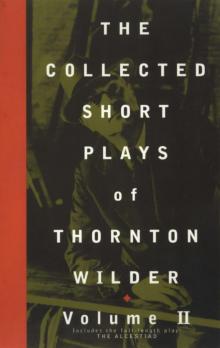 The Collected Short Plays of Thornton Wilder, Volume II
The Collected Short Plays of Thornton Wilder, Volume II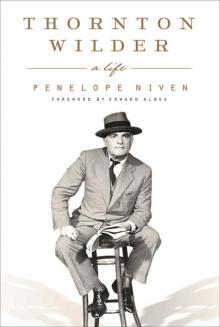 Penelope Niven
Penelope Niven The Selected Letters of Thornton Wilder
The Selected Letters of Thornton Wilder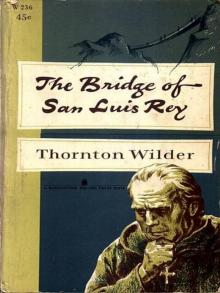 The Bridge of San Luis Rey
The Bridge of San Luis Rey Theophilus North
Theophilus North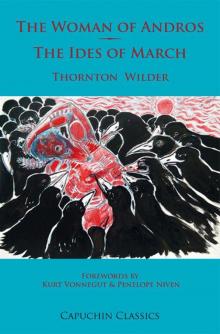 The Woman of Andros / the Ides of March
The Woman of Andros / the Ides of March The Eighth Day
The Eighth Day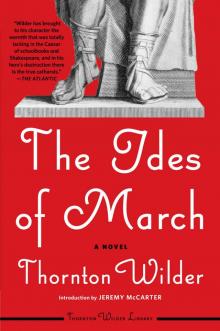 The Ides of March
The Ides of March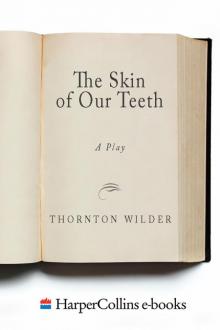 The Skin of Our Teeth
The Skin of Our Teeth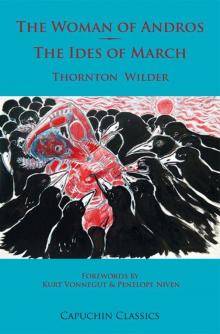 The Woman of Andros and The Ides of March
The Woman of Andros and The Ides of March